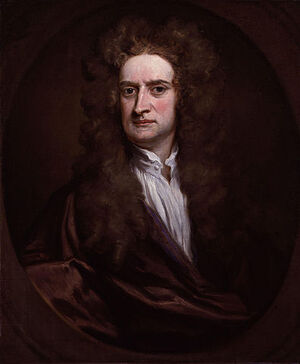Isaac Newton (nonfiction): Difference between revisions
No edit summary |
No edit summary |
||
| Line 4: | Line 4: | ||
Newton made seminal contributions to optics, and he shares credit with [[Gottfried Wilhelm Leibniz (nonfiction)|Gottfried Leibniz]] for the development of [[Calculus (nonfiction)|calculus]]. | Newton made seminal contributions to optics, and he shares credit with [[Gottfried Wilhelm Leibniz (nonfiction)|Gottfried Leibniz]] for the development of [[Calculus (nonfiction)|calculus]]. | ||
On October 2, 1667, Newton became a fellow at Trinity College, Cambridge. He had earned his bachelor's degree in 1665 and then spent two years at home in Lincolnshire inventing much of differential and integral calculus while Cambridge was closed due to plague. | |||
== In the News == | == In the News == | ||
Revision as of 09:32, 12 September 2018
Sir Isaac Newton FRS (25 December 1642 – 20 March 1726/27) was an English physicist and mathematician (described in his own day as a "natural philosopher") who is widely recognised as one of the most influential scientists of all time and a key figure in the scientific revolution.
His book Philosophiæ Naturalis Principia Mathematica ("Mathematical Principles of Natural Philosophy"), first published July 5, 1687, laid the foundations for classical mechanics.
Newton made seminal contributions to optics, and he shares credit with Gottfried Leibniz for the development of calculus.
On October 2, 1667, Newton became a fellow at Trinity College, Cambridge. He had earned his bachelor's degree in 1665 and then spent two years at home in Lincolnshire inventing much of differential and integral calculus while Cambridge was closed due to plague.
In the News
Fiction cross-reference
Nonfiction cross-reference
- Calculus (nonfiction)
- Gottfried Leibniz (nonfiction)
- Hypotheses non fingo (nonfiction)
- Gottfried Wilhelm Leibniz (nonfiction)
- Newton's method (nonfiction)
- Mathematics (nonfiction)
- Physics (nonfiction)
External links:
- Isaac Newton @ Wikipedia
